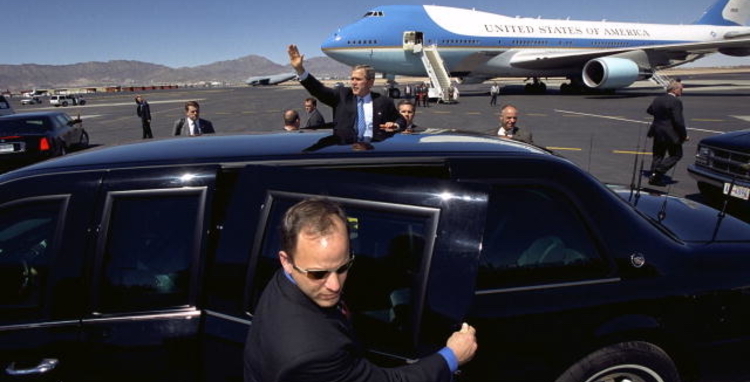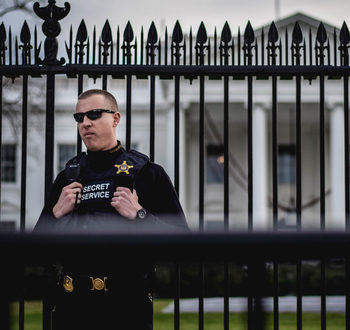The Secret Service Can’t Afford To Pay Agents Overtime Anymore
Secret Service agents are seriously overworked. New revelations from the federal agency suggest that hundreds of agents may also be underpaid. On Monday, August 21, 2017, the US Secret Service announced that, barring congressional action, the federal protection agency will no longer be able to pay agents overtime past the end of September. Interviewed by USA Today, Randolph Alles, director for the Secret Service, said over 1,000 officers have already reached the cap on salaries and overtime for the year, a limit established by federal law.
President Trump’s Travels Strain Federal Agency
What’s to blame for the Secret Services’ budgetary struggles? Some experts say the agency’s resources have been spread thin keeping up with President Trump and his high-profile, globe-trotting family. The President has shuttled between his many luxury residencies throughout the course of his nascent tenure, visiting at least one of his properties every weekend for the last six months. Trump’s children, who continue to run businesses of their own, fly overseas on a regular basis. In total, Trump’s entourage spans 42 people, including 18 family members who require 24-hour federal protection. Under the Obama administration, 31 individuals needed Secret Service escorts.

Current legislation restricts the annual salary of a Secret Service agent to $160,000, including overtime pay. Director Alles wants that threshold raised to $187,000 and he’s working with members of Congress to get it done. That increase should keep the Service afloat at least for President Trump’s first term, but even if passed, Alles says around 130 agents would still be owed back wages for hours and overtime they’ve already worked.
Protection Duties Drain Congressional Budget
The Secret Services’ troubles aren’t all due to President Trump, although the Trump era has ushered in unprecedented fiscal demands. Last year, during the Presidential Campaign that saw now-President Trump pitted against former-Secretary of State Hillary Clinton, federal lawmakers were forced to pass an emergency bill to compensate around 1,400 agents who had racked up thousands of hours in overtime wages.
In a press release intended to dispel the idea that his agency’s impending insolvency could be blamed solely on President Trump, Secret Service Director Alles wrote, “this issue is not one that can be attributed to the current administration’s protection requirements alone, but rather has been an ongoing issue for nearly a decade due to an overall increase in operational tempo.”
Mass Exodus Of Secret Service Agents
Grueling work hours are driving agents out of the Service. Around 500 agents have left the Service over the last year, but lawmakers have been worried about agency for years. After a 2014 incident in which an Iraq War veteran suffering from PTSD was discovered in the White House holding a small knife, a federal panel found that Secret Service agents had been working “an unsustainable number of hours.” The Service’s then-director, Julia Pierson, stepped down in the scandal’s wake, opening the path to a potential solution.
Over the last year, the agency went on a hiring spree, recruiting around 800 new agents and uniformed security personnel. But attrition rates continued to climb and the Service is now down approximately 300 agents compared to this time last year. That loss of manpower (only 10% of Secret Service agents are women) has put an even greater burden on the officers who haven’t left yet.
Scores of agents have found themselves abruptly re-assigned from criminal investigations and transferred from field offices across the nation to protect members of the President’s family, the New York Times reports. To secure Trump Tower alone, where the President’s adult sons often work, it costs around $308,000 every day.
New Drug Policy Opens Door To More Candidates
When protecting the President is your job, there’s no room to slack. “The president has a large family,” Alles told USA Today. “Our responsibility is required in law. I can’t change that. I have no flexibility.” Now, Alles is hoping to encourage a little more flexibility in Congress.
Alles intends to ramp up the Service’s hiring process even more. In June, the director announced plans to recruit 3,000 new agents in the next few years, a target he intends to meet by loosening the agency’s drug policy. Before Alles became agency Director, the Secret Service automatically disqualified applicants who had used marijuana a certain number of times. Under Alles’ new policy, applicants 28 or older will have to testify that they last used pot five or more years ago. Candidates under 24 have to remain pot-free for at least one year before applying.
The Secret Service’s Two Duties
The Secret Service actually has two responsibilities: protect the President and his family and investigate financial crimes. The agency was established in 1865, directly after the Civil War, when an estimated one-third of the money circulating through the re-unified states was counterfeit. The Service’s duties were only expanded in 1901, after President William McKinley was gunned down by an aspiring anarchist, Leon Czolgosz, at the Pan-American Exposition. Presidents, Congress soon concluded, needed more protection.
Investigations of financial wrongdoing, however, remain a core assignment for the Service and some pundits suggest that Director Alles may be bracing the agency for a wave of finance-related lawsuits leveled at President Trump and his family. But things are so bad that some lawmakers are trying to narrow the agency’s responsibilities. Jason Chaffetz, a US Representative for Utah, is looking for support in the House to terminate the Service’s cyber and financial missions entirely.
Assassination Threats Surge
At Salon, Mike Adams points to an additional problem. By law, the Secret Service is tasked with investigating every threat made against the President. Scott Hamann, a state representative from Maine, is now under investigation for referring to Trump in a tweet as a “half-term president, at most, especially if I ever get within 10 feet.” Calls for President Trump’s assassination, which have surged on social media, are only expected to grow over the next four years, another reason the Secret Service may be trying to boost its ranks.
It’s not just threats, either. American political life has become more physical since Trump announced his Presidential candidacy in June 2015. Crowds have become “bolder,” former Secret Service Director Joseph Clancy told USA Today. At rallies on the campaign trial, demonstrators attempted to jump the barrier placed in front of a presidential candidate at least six times, incursions Clancy is certain wouldn’t have happened in previous years.
It’s a particularly sensitive time for this problem to reach crisis proportions. The United Nations General Assembly is set to convene on September 12, 2017, bringing the heads of state from almost 150 foreign countries to Midtown Manhattan. All of those dignitaries will require Secret Service protection.

